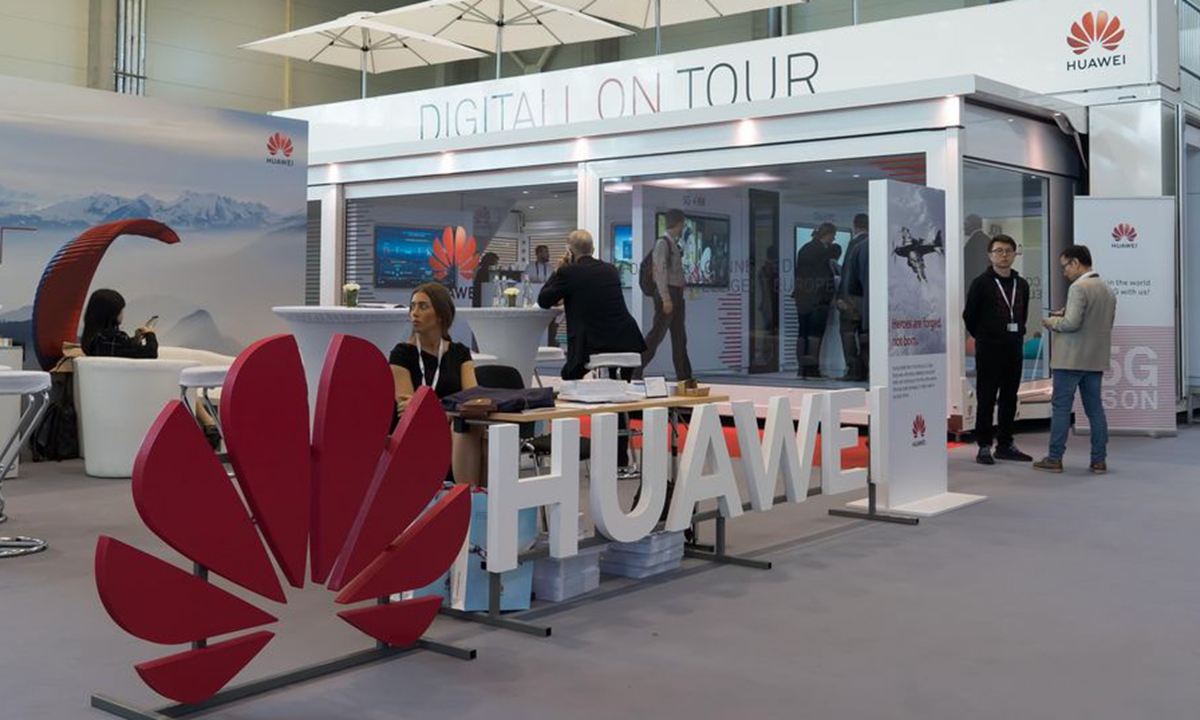US firms to cooperate with Huawei on 5G standards
By Ma Jingjing Source:Global Times Published: 2020/6/16 19:33:41
Commerce Department revises rules, but sticks to ‘America First’

Photo taken on Nov. 20, 2019 shows Huawei's exhibition booth during a press preview for the 2019 World 5G Convention in Beijing, capital of China.(Xinhua/Li Xin)
The US Department of Commerce announced a new rule on Monday allowing US companies to cooperate with Chinese technology company Huawei on 5G telecom standards.
Analysts said the move shows that the US has realized the cost of refusing to cooperate with the world's largest patent contributor to the next-generation mobile technology, rather than a relaxation of US government's crackdown on Huawei.
Under the new rule, US companies' technologies that would not have required a license to be disclosed to Huawei before the company's placement on the US Entity List in May 2019 can now be disclosed for the purpose of standards development, according to a statement on the Department of Commerce website.
"This is typical US practice that always aims for 'America First'," said Ma Jihua, a veteran industry analyst and close Huawei observer. "This action shows that the US government hasn't eased its assault on Huawei but is simply taking advantage of Huawei's leading place in the industry," he said.
Fundamentally, standards should be set in an open, fair, and non-discriminatory manner, while encouraging participation from global suppliers, scientific research institutions, industry organizations, and other players. Inclusiveness and productive dialogue will better promote the formulation of technical standards and encourage the healthy development of the industry and the global economy. Huawei's stance remains unchanged on these matters. We would like to continue holding sincere discussions in relation to standards for new technologies with our counterparts, including those in the US, contributing to the technological advancement of society at large, Huawei said in a note sent to the Global Times on Tuesday night.
Just a month ago, the US Department of Commerce made a fresh move to suppress Huawei by proposing a new rule to require licenses for sales to Huawei for semiconductor chips that are made abroad with US technologies. Details of the rule are expected to be revealed in mid-July.
US Commerce Secretary Wilbur Ross' rhetoric reflected some American politicians' narrow-minded "America First" view: "The department is committed to protecting US national security and foreign policy interests by encouraging US industry to fully engage and advocate for US technologies to become international standards."
William Jones, Washington bureau chief for US-based magazine Executive Intelligence Review (EIR), told the Global Times in a recent interview that the US' attack on Huawei is a clear attempt to undermine China's technological advances.
"As the US is currently unprepared to deal with China on an equal basis, it simply tries to bully other countries into following its lead," he said.
Over the past year, the US' squeezing of Huawei from global supply chains has paradoxically put many US companies into an awkward position.
On a global basis, Huawei has the highest number of declared 5G patents at 2,386 patent families, followed by LG with 1,388 patent families and Samsung with 1,353 patent families, according to a recent survey by technology research firm GreyB Services Pte and analytics firm Amplified AI Inc. US-based Qualcomm is No.5.
Meanwhile, many other countries are increasingly moving to ignore the US government demands and decide on the basis of what is best for their own national interests.
In January, UK Prime Minister Boris Johnson defied US President Donald Trump and allowed Huawei to build parts of the 5G network in the country.
As the extent of Huawei's involvement in the UK's 5G development is under discussion again, Scott Petty, chief technology officer of UK telecom services provider Vodafone, said that replacing Huawei equipment would deal a heavy blow to the country's 5G rollout, Financial Times reported.
Ma said: "Other countries like the UK and Canada should be able to make their own clear decisions now whether to use Huawei's technology in building their 5G networks."
Matthew Rous, group chief executive of the China-Britain Business Council (CBBC), told the Global Times on Tuesday via email that the CBBC welcomes the UK government's decision to allow Huawei to build the non-core parts of the country's 5G networks.
Early in February, Huawei announced it had obtained 91 5G commercial contracts worldwide, of which over half came from Europe.
Xiang Ligang, director-general of the Beijing-based Information Consumption Alliance, told the Global Times that this shows it will be difficult for Washington to continue its hardline strategy on Huawei due to the Chinese company's growing technological strength.
"The US may ramp up efforts to suppress more Chinese technology companies, but it doesn't know that external pressure always turn out to promote China's technological advancement," Xiang said, noting that China also has abundant countermeasures in its toolkit.
Posted in: INDUSTRIES